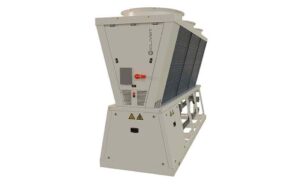Windows with an in-built cooling system
12th August 2013USA: Researchers at Harvard University claim to have developed a window with its own in-built cooling system.
The new window-cooling system – or a bio-inspired microfluidic circulatory system , as they call it – is said to contain an extensive network of ultra-thin channels in the window pane, through which water can be pumped when the window is hot. The channels consist of long, narrow troughs that are moulded into a thin sheet of clear silicone rubber that, when stretched over a flat pane of glass, create sealed channels.
According to the team working on the system, the technology could also be used to cool rooftop solar panels, allowing them to generate electricity more efficiently.
Today’s insulation and construction methods do a good job keeping heat from leaking through walls, but heat transfer through glass windows remains one of the major stumbling blocks to energy-efficient buildings.
The idea to cool glass windows when they get hot emerged from work on microfluidics by Don Ingber, founding director of the Wyss Institute and professor of bioengineering at Harvard SEAS.
Microfluidic devices circulate fluids through tiny, ultrathin channels and are typically used to build small devices for laboratory research and clinical diagnosis.
Using this knowledge, the Harvard team created and tested a 4in-square microfluidic windowpane and found that when the channels were filled with water, they were also transparent to the eye.
They then used a heat lamp to heat a microfluidic pane to 100°F — as hot as a window might get on a sunny summer day. Using a special infrared camera, they showed that the circulatory system could readily cool the pane.
A mathematical model developed to predict how the circulatory system would perform on normal-size windows, calculated that pumping just half a soft drink can’s worth of water through the window’s circulatory system would cool a full-size window pane by a full 8°C (14°F). Significantly, the energy needed to pump water would be far less than the heat energy the water absorbed.
“Our new window technology marries advances in microfluidics with creative thinking about adaptive architecture,” Ingber said. “We are optimistic that microfluidic windows will go a long way toward helping us cool our homes and commercial buildings more efficiently.”









